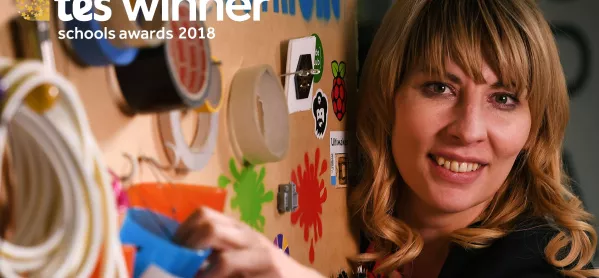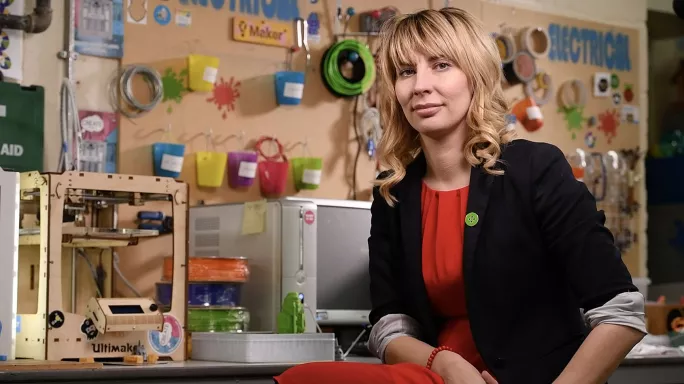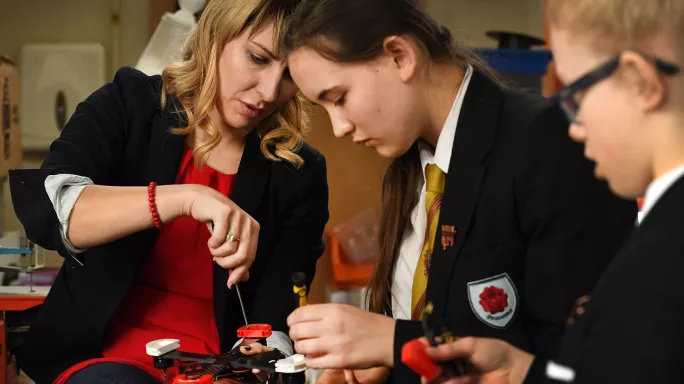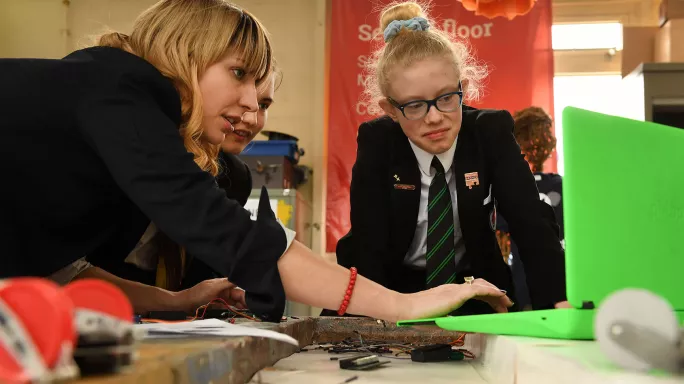- Home
- The trailblazing teacher who turns pupils into ‘makers’
The trailblazing teacher who turns pupils into ‘makers’

Caroline Keep is passionate about two aspects of her job: inspiring children through science and technology and making things.
In her job at Penketh High School, near Warrington, she combines the two and in a big way.
Ms Keep, who won new teacher of the year at last year’s Tes Schools Awards, is not only a physics teacher.
Quick read: Caroline Keep new teacher of the year
Top tips: How to create a school makerspace
Comment: We must put humans at the centre of EdTech
She is also the director of the country’s first state school-based “makerspace” classroom, where she aims to get all of the school’s pupils inspired by science and technology.
The Spark at Penketh is the fulfilment of an ambition she developed before she had even started training to be a teacher.
She came into teaching after “catching the bug” for helping young people to learn while doing outreach work as a scientist.
Ms Keep is also a passionate and prominent member of the “maker community”, which she describes as a culture of people who use technology, imagination and a do-it-yourself mindset to create things using electronics, robotics, computing and 3D printing.
Makerspace
Once she decided to take the plunge and retrain to be a teacher, she always had the vision for creating a makerspace in a state school.
Now she has turned the idea into a reality, but the journey has been far from straightforward.
She traces her passion for inspiring pupils through science and technology back to her previous career as a scientist for the Canal and Rivers Trust.
“I was working as a geophysical engineer, as a scientist previously. I did a whole bunch of outreach at universities to get more young people especially more young women involved in science technology and engineering.”
She had been part of the maker community for 10 years and decided to bring this into mainstream education.

“Working with a university, I said to them, ‘If you want to make science more interesting then why don’t you bring a makerspace into your teaching?’ It proved really popular at John Moores University.
“But working with students at a higher level, I realised very quickly that some of them had lost that spark. Quite a lot of them didn’t have that sense of ‘can do’ or growth mindset that you really want in science students.”
Becoming a teacher
Ms Keep decided that for that she would need to work in schools with younger students.
During her training year at Edge Hill University, she also found the time to launch a new maker festival at Liverpool Central Library, which attracts thousands of young people and is now set to become a national event.
And when her first teaching job arrived, it might have seemed like the perfect fit - at the recently launched Future Tech Studio school in Warrington.
Unfortunately, the school was shut down within two years of her arriving and she was made redundant.
Ms Keep told Tes that this experience made her seriously question whether teaching was the career for her.
However, at Penketh High School she was able to find a new home for her ambitions and she has never looked back.
After six months of teaching physics at the school, she opened Spark at Penketh - the country’s first state-school-based makerspace.
Stepping inside, it looks something like the cross between an old craft, design and technology classroom and a hi-tech science lab.

As Ms Keep speaks to Tes, enthused pupils are moving around us working with Microbits, 3D printers and Raspberry Pi computers. She is constantly fielding questions.
The children have been sent in to help with the photoshoot but their passion for their subject is very clearly the real thing.
It is the first of its kind in the country but Ms Keep is adamant that any school could open their own makerspace classroom.
“Most of the equipment you see in here has actually been donated,
“Our 3D printer the kids built themselves with donated parts. To get the space organised doesn’t take much. Universities donated keyboards and power leads.

“Most of the storage here is from old DT projects. Parents sent us old hammers, nails, saws, old X-boxes which we could take components out of and then you don’t say no to things.”
Ms Keep tells Tes that the makerspace is used by all pupils at the school both as part of various subject’s teaching but also through a separate digital pathway.
The school is planning to use the space to run a Duke of York iDEA (inspiring digital enterprise award) scheme to give pupils formal recognition of the extra work they carry out.
She said: “We have extended our day to get this right. We run Spark sessions throughout each term - they are pitched at specific skills to learn through each term.
“We just did 3D printing, the last one we did was using Raspberry Pi for physical computing, the one before that was design thinking.
“If you put a bunch of kids in a space like that and you don’t give them the skills to use the kit then they are always dependent on you to be able to use it whereas if you take the time to skill them in particular technologies then they will invent things that you don’t think of.”
The children’s enthusiasm is huge but Ms Keep is very clear that although this looks like a different world - it is still a classroom and learning is at the forefront of what they do.
“As with all edtech, you have got to put learning at the forefront of it. The learning comes first.
“The first thing we have asked is where is the benefit, what are they learning? Exactly how does that enrich our curriculum, enhance our students’ lives or help towards their GCSEs?
“I am very bottom line orientated. If anything the tech you use in here places more emphasis on learning because you can’t fluff your way through it so to speak. Anything they do learn they make.”
Ms Keep talks with passion and energy about the importance of young girls becoming enthused by science, technology, engineering, arts and maths.
She tells how her own interest in being part of the maker community dates back to her and her daughter taking part in a soldering course when her daughter was still in primary school.
But she also believes that Penketh High School’s makerspace helps to improve pupils approach to learning across the school.
Teaching resilience
“Spark has its own ethos and culture - if you look around, it’s not like a typical classroom and that makes it quite different when teachers come in.
“You work in collaboration most of the time. You are here as a guiding post to steer students. You don’t necessarily tell them that it has to be done like this - that makes them less risk-averse and I think that makes them better learners.
“It gives them greater grit and resilience. All of those qualities that we know are key to getting great learners can be practised in here.
“We talk about the importance of resilience but where in a school can you practice it in an environment where you are happy if they don’t get it right?”
Her makerspace is the country’s first inside a state school. But she hopes that the recognition of the Tes award will help encourage others to be established.
“Since I won my Tes award, there has been quite an uptake in the interest in it.
“In the United States, it’s massive, absolutely massive; in China, there is a huge amount of makerspaces; in Italy, there has been a commitment to put a makerspace into every school in the country.
“The prominence is huge in other parts of the world, here we had a real issue getting it into the curriculum. It’s such a different way of teaching.
“It engages and enthuses, it gets students switched on to their learning, it encourages growth mindset.
“You get more cognitive hooks in there. I can do something in Year seven and it is something they will never forget and that is because when the students make something they are invested in it.”
CV: Caroline Keep
- PGCE physics at Edge Hill University, 2014-15
- Creator of Liverpool Makefest, 2014 onwards
- Teacher of physics, sciences, engineering and making at Future Tech studio school, Warrington, 2015-17
- Physics teacher and director of the Spark Makerspace at Penketh High School, 2017 onwards
Keep reading for just £1 per month
You've reached your limit of free articles this month. Subscribe for £1 per month for three months and get:
- Unlimited access to all Tes magazine content
- Exclusive subscriber-only stories
- Award-winning email newsletters



